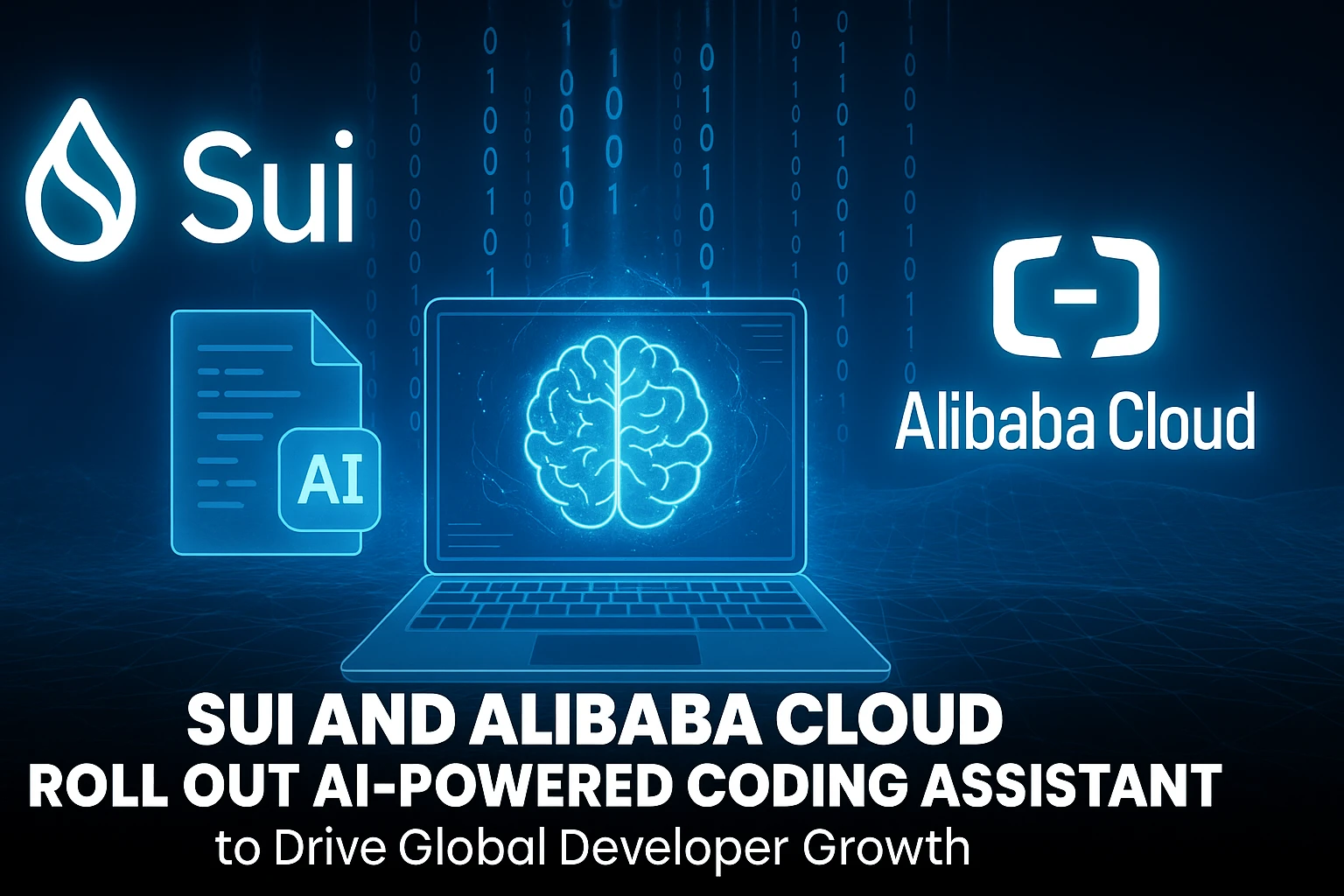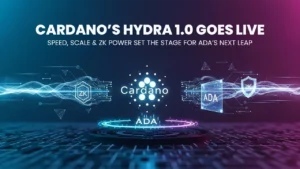Sui and Alibaba Cloud Roll Out AI-Powered Coding Assistant to Drive Global Developer Growth

Sui Network revealed on Thursday the launch of an AI-powered coding assistant for its Move programming language, developed in collaboration with Alibaba Cloud.
- Market Reaction and Metrics
- A Quick Snapshot of Post-Launch Metrics
- Developer Adoption and Language Inclusivity
- Institutional Momentum and Competitive Positioning
- Technical Integration: AI, Move, and Delegated Proof of Stake Ecosystem
- Broader Industry Trends and Comparative Landscape
- Vision: From Innovation to Ecosystem Expansion
- Conclusion
- Frequently Asked Questions About Sui and Alibaba Partnership
- What is the Sui AI coding assistant?
- How does the assistant impact Sui’s blockchain model?
- What market reaction followed the launch?
- How does it compare to tools like GitHub Copilot or Cursor?
- Are institutions involved with SUI adoption?
- Glossary of Key Terms
According to media reports, hosted within the ChainIDE development platform, the tool enables developers to generate Move code via natural language prompts, access real-time security scanning, utilize multilingual interfaces (English, Chinese, and Korean), and benefit from auto-documentation and prebuilt templates. The tool is live as of August 27, 2025.
This release builds on strategic infrastructure partnerships dating back to March 2023, when Mysten Labs and Alibaba Cloud brokered support for archival nodes and validator infrastructure.
The launch is also significant because Sui is built on a Delegated Proof of Stake model, where token holders delegate their stake to validators who secure the network. By introducing advanced AI support for developers, the partnership strengthens the productivity layer that fuels transaction activity, validator engagement, and long-term ecosystem health.
ALSO READ: USDC Expansion to XDC Network Boosts Circle as TRON Slashes Transaction Cost by 50%
Market Reaction and Metrics
The market reacted swiftly and positively to the announcement. SUI’s price climbed by between one and two percent, settling near $3.44. Market capitalization rose towards $12 billion. Despite softened trading volume, open interest lifted by about 3.7 percent, signaling sustained investor engagement.
Analysts noted technical resistance around $3.50, but emphasized that the news is boosting sentiment around utility and developer growth.
A Quick Snapshot of Post-Launch Metrics
| Metric | Value or Trend |
| Launch Date | August 27 2025 |
| SUI Price | ~3.44 dollars (up 1–2%) |
| Market Cap | ~12 billion dollars |
| Trading Volume | Lower than average but active |
| Open Interest | +3.7 percent |
| Developer Activity | Significant increase in ChainIDE usage |
| Institutional Adoption | Custody services added by Swiss banks |
Developer Adoption and Language Inclusivity
Initial indications suggest a notable increase in developer adoption through ChainIDE. Some users report development speed improvements of more than 40% thanks to AI assistance in code generation and debugging.
The assistant’s multilingual capability is particularly impactful in expanding Sui’s reach across Asia and other non-English-speaking regions.
Over half of Sui’s prospective developer users hail from outside English-speaking markets. Now they can write prompts in their native language and receive Move code, security checks, and documentation instantly.
This innovation aligns with broader trends. Web3 platforms are increasingly using AI to democratize development. The AI assistant simplifies Move onboarding for newcomers and enables rapid iteration.
ALSO READ: Cardano and XRP Join Forces for Wider Multichain Global Adoption
Institutional Momentum and Competitive Positioning
Institutional engagement with Sui is also on the rise. Swiss banks, including Sygnum and Amina Bank, now offer custody and trading services for Sui.
Asset managers such as Franklin Templeton and Grayscale have expanded their product lines to include SUI exposure. These developments reinforce Sui’s position as a serious contender in the regulated finance sector.
Combining institutional infrastructure with AI-enhanced tooling strengthens trust and liquidity pathways, increasing appeal to both developers and investors.
Official statements further underscore this collaboration’s significance:
Move is already a powerhouse.
With @alibaba_cloud’s AI coding assistant in @ChainIDE, it’s also multilingual, secure, and lightning fast to ship ⚡ pic.twitter.com/iSfLmQSD4M
— Sui (@SuiNetwork) August 27, 2025
And Alibaba Cloud added:
We're excited to join forces with @SuiNetwork to bring our AI coding assistant to Sui Move developers — with full support in English, Chinese, and Korean.
Now you can:
✨ Generate Move code from natural language
✨ Get smart autocomplete & real-time security checks
✨… pic.twitter.com/tWi4urPPyz— Alibaba Cloud (@alibaba_cloud) August 27, 2025
Technical Integration: AI, Move, and Delegated Proof of Stake Ecosystem
Sui’s unique architecture combines the Move language with parallel transaction execution and delegates security to a Delegated Proof of Stake consensus. Token holders delegate their stake to validators who secure the network and share rewards. Added incentives through storage fees reinforce the economics of validators. As developers build more dApps, usage increases, benefiting validators and enhancing the utility of the SUI token.
The AI assistant is a multiplier for these dynamics. Faster development enables higher transaction throughput and facilitates the deployment of smart contracts. Increased activity generates fees, boosts staking, and deepens network decentralization, reinforcing Sui’s consensus structure.
Programmatically, the assistant addresses common developer pain points by automatically generating code and documentation, as well as scanning for vulnerabilities. This fosters confidence among teams and audit reviewers, enabling more robust launch cycles and enhanced collaboration.
Broader Industry Trends and Comparative Landscape
Sui’s AI assistant enters a field where many tools compete for developer mindshare. On Ethereum, tools like GitHub Copilot and Claude-powered agents assist in writing code and answering queries. Web3 frameworks, such as Hardhat for Ethereum and Anchor for Solana, have strong developer support but lack AI-driven natural language capabilities.
AI-enabled coding tools are proliferating. In mainstream sectors, offerings like OpenAI’s Codex, Microsoft’s Copilot, and Anthropic’s Claude are integrated into IDEs, facilitating autocompletion, debugging, and code review. Developers are leveraging vibe coding techniques to compose prompts and let AI assist with end-to-end tasks.
Startups like Cursor (built by Anysphere Inc.) have achieved valuations of nearly $10 billion and deliver AI-native IDE experiences. Their agents can auto-complete implementation tests and query codebase logic. Qodo (formerly CodiumAI) offers enterprise-grade code integrity solutions with AI reviews and testing capabilities
Tools like GitHub Copilot, Tabnine, and IntelliCode continue to be popular for general development. They provide context-aware suggestions and reduce friction.
In Web3, Sui’s AI assistant stands out. This is one of the first integrated AI agents dedicated to a layer one blockchain’s native language. It addresses both technical depth and global accessibility within a high-performance dPoS environment.
Vision: From Innovation to Ecosystem Expansion
The AI assistant’s implications extend far beyond coding productivity. It has the potential to:
- Catalyze dApp growth across diverse verticals, including DeFi gaming and NFT marketplaces
- Increase daily active users (DAU) and Total Value Locked (TVL) through faster deployment
- Reinforce validator participation and staking activity, supporting network stability
- Elevate cross-border developer recruitment and global collaboration
- Attract institutional capital and regulatory acceptance for SUI-based products
These outcomes feed back into the Delegated Proof of Stake structure, amplifying decentralization, load distribution, and on-chain governance.
Conclusion
The launch of Sui’s AI Move coding assistant in partnership with Alibaba Cloud marks an inflection point for Web3 development. Delivered within ChainIDE, the tool enables natural language workflows, real-time vulnerability detection, multilingual support, automation, and documentation.
Alongside a positive market response, a surge in developer adoption, and the building of institutional infrastructure, the tool reinforces Sui’s foundation in Delegated Proof of Stake. By aligning developer productivity with financial and consensus-layer dynamics, Sui closes the feedback loop between the utility of usage tokens and validator health.
In a crowded ecosystem of AI tools, Sui’s solution is notable for being the first of its kind within a high-scale blockchain platform. It lays a blueprint for how AI can reduce barriers, globalize development, and strengthen decentralized networks. As adoption grows, Sui may emerge as a leading model for blending AI and blockchain innovation.
Frequently Asked Questions About Sui and Alibaba Partnership
What is the Sui AI coding assistant?
It is an artificial intelligence–powered tool integrated into ChainIDE, enabling Move contract development using natural language with features such as multilingual support, real-time security scanning, documentation generation, and templates
How does the assistant impact Sui’s blockchain model?
By accelerating developer adoption and on-chain activity, it drives more transaction volume, staking, and validator engagement, reinforcing Sui’s Delegated Proof of Stake infrastructure
What market reaction followed the launch?
SUI’s price rose 1 to 2 percent toward 3.44 dollars, the market cap increased to around 12 billion dollars, and open interest climbed by nearly 4 percent
How does it compare to tools like GitHub Copilot or Cursor?
Unlike general AI coding assistants, Sui’s tool is tailored to Move and integrates directly into Sui’s platform, offering multilingual support and blockchain-focused features. In contrast, Cursor and GitHub Copilot serve broader development use cases.
Are institutions involved with SUI adoption?
Yes. Swiss banks such as Sygnum and Amina now offer custody and trading services, and large asset managers have launched SUI-inclusive products.
Glossary of Key Terms
- AI coding assistant: A tool that uses artificial intelligence to generate and audit Move smart contract code.
- Move: Programming language optimized for safety and performance.
- ChainIDE: Integrated development environment for Sui development.
- Delegated Proof of Stake: A consensus model where token holders delegate validation rights to nodes.
- DPoS: Abbreviation for Delegated Proof of Stake.
- Validator: Node authorized to validate transactions and secure the blockchain.
- Epoch: Fixed time cycle during which validators and delegations remain constant.
- Storage Fund: On-chain reserve funded by data storage fees to support validators and deflation mechanics.
- TVL (Total Value Locked): Measure of assets deployed within decentralized applications.
- Multilingual Support: Availability of developer tools in multiple languages to broaden access.




